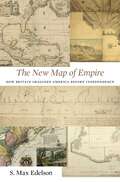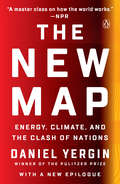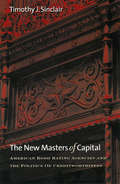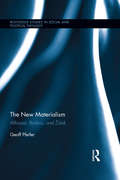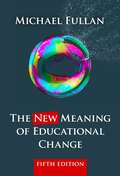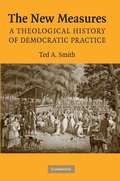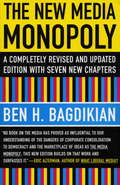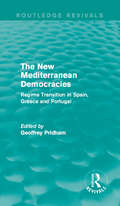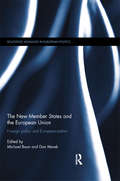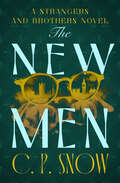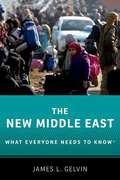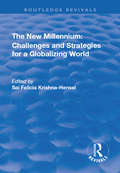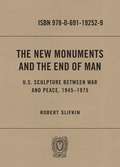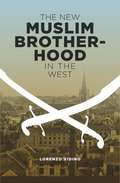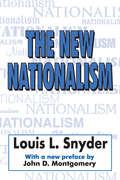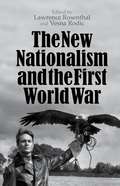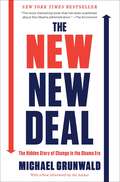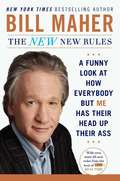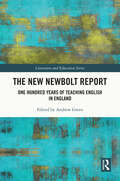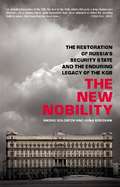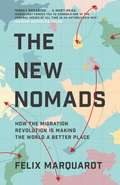- Table View
- List View
The New Map of Empire: How Britain Imagined America before Independence
by S. Max EdelsonIn 1763 British America stretched from Hudson Bay to the Keys, from the Atlantic to the Mississippi. Using maps that Britain created to control its new lands, Max Edelson pictures the contested geography of the British Atlantic world and offers new explanations of the causes and consequences of Britain’s imperial ambitions before the Revolution.
The New Map: Energy, Climate, and the Clash of Nations
by Daniel YerginPulitzer Prize-winning author and global energy expert, Daniel Yergin offers a revelatory new account of how energy revolutions, climate battles, and geopolitics are mapping our futureThe world is being shaken by the collision of energy, climate change, and the clashing power of nations in a time of global crisis. The "shale revolution" in oil and gas--made possible by fracking technology, but not without controversy--has transformed the American economy, ending the "era of shortage", but introducing a turbulent new era. Almost overnight, the United States has become the world's number one energy powerhouse--and, during the coronavirus crisis, brokered a tense truce between Russia and Saudi Arabia. Yet concern about energy's role in climate change is challenging our economy and way of life, accelerating a second energy revolution in the search for a low carbon future. All of this has been made starker and urgent by the coronavirus pandemic and the economic Dark Age that it has wrought.The chessboard of world politics has been upended. A new cold war is emerging with China; and rivalries grow more dangerous with Russia, which is pivoting east toward Beijing. Vladimir Putin and China's Xi Jinping are converging both on energy and on challenging American leadership, as China projects its power and influence in all directions. The South China Sea, claimed by China and the world's most critical trade route, could become the arena where the United States and China collide directly. The map of the Middle East, which was laid down after World War I, is being challenged by jihadists, revolutionary Iran, ethnic and religious clashes, and restive populations. But the region has also been shocked by the two recent oil price collapses--one from the rise of shale, the other the coronavirus--and by the very question of oil's future in the rest of this century.A master storyteller and global energy expert, Daniel Yergin takes the reader on an utterly riveting and timely journey across the world's "new map". He illuminates the great energy and geopolitical questions on the eve of the historic 2020 Presidential election and the profound challenges that lie ahead.
The New Masters of Capital: American Bond Rating Agencies and the Politics of Creditworthiness
by Timothy J. SinclairIn The New Masters of Capital, Timothy J. Sinclair examines a key aspect of the global economy--the rating agencies. In the global economy, trust is formalized in the daily operations of such firms as Moody's and Standard & Poor's, which continuously monitor the financial health of bond-issuers ranging from private corporations to local and national governments. Their judgments affect unimaginably large sums, approximately $30 trillion in outstanding debt issues, according to a recent Moody's estimate. The difference between an AA and a BB rating may cost millions of dollars in interest payments or determine if a corporation or government can even issue bonds. Without bond rating agencies, there would be no standard means to compare risks in the global economy, and international investment would be problematic. Most observers assume that the agencies are neutral and scientific, and that they interpret their role in narrowly economic terms. But these agencies, by their nature, wield extraordinary power and exert massive influence over public policy. Sinclair offers a highly accessible account of these institutions, their origins, and the rating processes they use to judge creditworthiness. Illustrated with a wide range of cases, this book offers a fresh assessment of the role of an often-overlooked institution in the dynamics of modern global capitalism.
The New Materialism: Althusser, Badiou, and Žižek (Routledge Studies in Social and Political Thought #102)
by Geoff PfeiferAlain Badiou and Slavoj Žižek have become two of the dominant voices in contemporary philosophy and critical theory. In this book, Geoff Pfeifer offers an in-depth look at their respective views. Using Louis Althusser’s materialism as a starting point—which, as Pfeifer shows, was built partially as a response to the Marxism of the Parti Communiste Français and partially in dialogue with other philosophical movements and intellectual currents of its times—the book looks at the differing ways in which both Badiou’s and Žižek’s work attempt to respond to issues that arise within the Althusserian edifice. Pfeifer argues here that, ultimately, Žižek’s materialism succeeds in responding to these issues in ways that Badiou’s does not. In building this argument, Pfeifer engages not only with the work of Althusser, Badiou, and Žižek and their intellectual backgrounds, but also with much of the contemporary scholarship surrounding these thinkers. As such, Pfeifer’s book is an important addition to the ongoing debates within contemporary critical theory.
The New Meaning of Educational Change, Fifth Edition
by Michael FullanThe book that revolutionized the theory and practice of educational change is now in its Fifth Edition! Michael Fullan’s The New Meaning of Educational Change is the definitive textbook on the study of educational change. Based on practical and fundamental work with education systems in several countries, the text captured the dilemmas and leading ideas for successful large-scale systemic reform. This updated edition includes decisionmakers at all levels―from the local school community to the state and national level―and introduces many new and powerful ideas for formulating strategies and implementing solutions that will improve educational systems. <P><P>Widely used by university professors, policymakers, and practitioners throughout North America and in many other countries, this perennial bestseller shows us how to: <P><P>Develop collaborative cultures at the school level, while avoiding superficial versions of professional learning communities. <P><P>Foster district-wide success in all schools, illustrating how state and national systems can achieve total system transformation based on identifying and fostering meaning for educators at every level. <P><P>Integrate individual and systemic success, a rare feat in today’s school reform efforts. <P><P>The New Meaning of Educational Change, Fifth Edition is your comprehensive textbook on all aspects of the management of educational change―a powerful resource for everyone involved in school reform.
The New Measures: A Theological History of Democratic Practice
by Ted A. SmithCombining histories of performance, space, institutions, and ideas, the book tells the story of the 'new measures' that circulated in the religious revivals of the 1820s and '30s.
The New Media Monopoly
by Ben H. BagdikianWhen the first edition of The Media Monopoly was published in 1983, critics called Ben Bagdikian's warnings about the chilling effects of corporate ownership and mass advertising on the nation's news "alarmist." Since then, the number of corporations controlling most of America's daily newspapers, magazines, radio and television stations, book publishers, and movie companies has dwindled from fifty to ten to five.The most respected critique of modern mass media ever issued is now published in a completely updated and revised twentieth anniversary edition.'Ben Bagdikian has written the first great media book of the twenty-first century. The New Media Monopoly will provide a roadmap to understanding how we got here and where we need to go to make matters better.' -Robert McChesney, author of Rich Media, Poor DemocracyFrom the Trade Paperback edition.
The New Mediterranean Democracies: Regime Transition in Spain, Greece and Portugal (Routledge Revivals)
by Geoffrey PridhamThis volume, first published in 1984, discusses the viability of applying the ‘Mediterranean model’ to three countries that were transitioning to democracy, – Spain, Greece and Portugal – combining both comparative and national case-study approaches. In particular, Spain, Greece and Portugal offer comparable examples of the problems of establishing new democratic systems within relatively unstable and economically less developed environments. This title applies different theories of regime transition to the countries in question. This volume will be of interest to students of politics.
The New Member States and the European Union: Foreign Policy and Europeanization (Routledge Advances in European Politics)
by Dan Marek Michael BaunThis book examines the impact of EU membership on the foreign policies of the 12 new member states that joined the EU in 2004 and 2007. Among scholars of European politics there is a general consensus that membership in the European Union changes the countries that join. Yet considerable debate remains over what exactly changes, to what extent, how or why these changes happen, and why some countries, policies, and institutions change more than others. Expert contributors examine the impact of EU integration and membership, with chapters on the 12 new EU entrants since 2004: Poland, Czech Republic, Hungary, Slovakia, Slovenia, Estonia, Latvia, Lithuania, Cyprus, Malta, Bulgaria, and Romania. Utilizing a common analytical framework, each of the country case studies examines the impact of EU membership on the foreign policies of the new member states in three key areas: foreign policy making institutions and procedures, interests and preferences, and strategies and actions. The New Member States and the European Union will be of interest to students and scholars of European Studies and European Union Politics.
The New Men (The Strangers and Brothers Novels)
by C.P. SnowWinner of the James Tait Black Prize: Two brothers find themselves at odds amid Britain&’s quest for an atomic weapon, in this vivid historical novel. As the Second World War begins to rage, Britain&’s brightest minds put their efforts into the development of atomic munitions, laboring away in a closely guarded research station in a Warwickshire village. Lewis Eliot, in a stint as a civil servant, gets his brother, Martin, a position there. But as tensions and debate swirl among the scientific community, the opportunity may turn into a full-blown crisis, in this gripping novel by a Booker Prize finalist whose wide-ranging career spanned the worlds of both science and government in mid-twentieth century Britain. &“A master craftsman in fiction.&” —The New York Times &“Together, the [Strangers and Brothers] sequence presents a vivid portrait of British academic, political and public life.&” —Jeffrey Archer, The Guardian
The New Middle East
by Fawaz A. GergesThe New Middle East is one of the first comprehensive books written by prominent scholars of the region and of comparative politics to critically examine the Arab popular uprisings of 2011 2012. While these uprisings prompted a number of cursory publications, this volume contains meticulous and thoughtful reflections on the causes, drivers and effects of these seminal events on the internal, regional and international politics of the Middle East and North Africa. Although specific conditions in individual countries that have experienced large-scale popular mobilizations are investigated, they are neither treated in isolation nor separated from broader developments in the region. Instead, the authors highlight connections between individual case studies and systemic conditions throughout the Arab arena. These include the crisis of political authority, the failure of economic development and new genres of mobilization and activism, especially communication technology and youth movements. The careful analysis and reflection on the prospects for democratic change in the region ensures the book will have both an immediate and enduring appeal.
The New Middle East (What Everyone Needs To Know)
by James L. GelvinIn the aftermath of the collapse of the USSR, the American invasion of Iraq, and the Arab uprisings of 2010-11, a new Middle East has emerged. The Syrian civil war has displaced half the country's population, and ISIS and other jihadi groups thrive in the political vacuum there and in Iraq, setting a new standard for political violence. Meanwhile, regimes in Egypt and Bahrain have become even more repressive after the uprisings there, and Libya and Yemen have virtually ceased to exist as states. The hallmarks of this new Middle East are rebellion and repression, proxy wars, sectarian strife, the rise of the Islamic State, and intraregional polarization. International and regional actors stoke the flames, with the United States and Russia seeking to reposition themselves in the region and Saudi Arabia and Iran vying for supremacy. In the long term, perils including climate change, food and water insecurity, and population growth, along with bad governance and stagnant economies, will determine the destiny of the region. In this book, renowned Middle East scholar James L. Gelvin explains all these developments and more in a concise question-and-answer format. Outlining the social, political, and economic contours of the New Middle East, he illuminates the current crisis in the region and explores how the region will continue to change in the decades to come.
The New Millennium: Challenges And Strategies For A Globalizing World (Routledge Revivals)
by Sai Felicia Krishna-HenselThis title was first published in 2000: An important look at the complexity of the challenges faced by the international system at the beginning of the new millennium. The shape of the New World Order is being driven largely by forces unleashed through factors such as economic globalization and technological development. The book emphasizes the importance of interdisciplinary analysis in order to understand the extent and diversity of the factors which condition the dynamics of this transformation. Essential reading for students of human rights, security, finance and technology.
The New Monuments and the End of Man: U.S. Sculpture between War and Peace, 1945–1975
by Robert SlifkinHow leading American artists reflected on the fate of humanity in the nuclear era through monumental sculptureIn the wake of the atomic bombings of Japan in 1945, artists in the United States began to question what it meant to create a work of art in a world where humanity could be rendered extinct by its own hand. The New Monuments and the End of Man examines how some of the most important artists of postwar America revived the neglected tradition of the sculptural monument as a way to grapple with the cultural and existential anxieties surrounding the threat of nuclear annihilation.Robert Slifkin looks at such iconic works as the industrially evocative welded steel sculptures of David Smith, the austere structures of Donald Judd, and the desolate yet picturesque earthworks of Robert Smithson. Transforming how we understand this crucial moment in American art, he traces the intersections of postwar sculptural practice with cybernetic theory, science-fiction cinema and literature, and the political debates surrounding nuclear warfare. Slifkin identifies previously unrecognized affinities of the sculpture of the 1940s and 1950s with the minimalism and land art of the 1960s and 1970s, and acknowledges the important contributions of postwar artists who have been marginalized until now, such as Raoul Hague, Peter Grippe, and Robert Mallary.Strikingly illustrated throughout, The New Monuments and the End of Man spans the decades from Hiroshima to the Fall of Saigon, when the atomic bomb cast its shadow over American art.
The New Multinationals
by Mauro F. Guillén Esteban García-CanalA new breed of multinational companies is reshaping competition in global industries. For most of the 19th and 20th centuries, multinational firms came from the most technologically advanced countries in the world. Over the last two decades, however, new multinational firms from upper-middle-income economies (e. g. Spain, Ireland, Portugal, South Korea, and Taiwan), developing countries (e. g. Egypt, Indonesia, and Thailand), and oil-rich countries (e. g. United Arab Emirates, Nigeria, Russia, and Venezuela) have become formidable global competitors. These firms do not necessarily possess technological or marketing skills. In contrast to the classic multinationals, they found strength in their ability to organize, manage, execute, and network. They pursued a variety of strategies including vertical integration, product diversification, learning by doing, exploration of new capabilities, and collaboration with other firms. This book documents this phenomenon, identifies key capabilities of the new multinationals, and provides a new conceptual framework to understand its causes and implications.
The New Muslim Brotherhood in the West
by Lorenzo VidinoIn Europe and North America, networks tracing their origins back to the Muslim Brotherhood and other Islamist movements have rapidly evolved into multifunctional and richly funded organizations competing to become the major representatives of Western Muslim communities and government interlocutors. Some analysts and policy makers see these organizations as positive forces encouraging integration. Others cast them as modern-day Trojan horses, feigning moderation while radicalizing Western Muslims. Lorenzo Vidino brokers a third, more informed view. Drawing on more than a decade of research on political Islam in the West, he keenly analyzes a controversial movement that still remains relatively unknown. Conducting in-depth interviews on four continents and sourcing documents in ten languages, Vidino shares the history, methods, attitudes, and goals of the Western Brothers, as well as their phenomenal growth. He then flips the perspective, examining the response to these groups by Western governments, specifically those of Great Britain, Germany, and the United States. Highly informed and thoughtfully presented, Vidino's research sheds light on a critical juncture in Muslim-Western relations.
The New Muslim Brotherhood in the West (Columbia Studies in Terrorism and Irregular Warfare)
by Lorenzo VidinoIn Europe and North America, networks tracing their origins back to the Muslim Brotherhood and other Islamist movements have rapidly evolved into multifunctional and richly funded organizations competing to become the major representatives of Western Muslim communities and government interlocutors. Some analysts and policy makers see these organizations as positive forces encouraging integration. Others cast them as modern-day Trojan horses, feigning moderation while radicalizing Western Muslims. Lorenzo Vidino brokers a third, more informed view. Drawing on more than a decade of research on political Islam in the West, he keenly analyzes a controversial movement that still remains relatively unknown. Conducting in-depth interviews on four continents and sourcing documents in ten languages, Vidino shares the history, methods, attitudes, and goals of the Western Brothers, as well as their phenomenal growth. He then flips the perspective, examining the response to these groups by Western governments, specifically those of Great Britain, Germany, and the United States. Highly informed and thoughtfully presented, Vidino's research sheds light on a critical juncture in Muslim-Western relations.
The New NHS: A Guide
by Alison Talbot-Smith Allyson M. PollockDr Alison Talbot-Smith, an experienced doctor and researcher, and Professor Allyson M. Pollock, one of the UKs leading authorities on the NHS, give a lucid and incisive account of the new NHS – which has emerged from a far-reaching programme of market-oriented changes. Providing an authoritative and accessible overview of the new NHS, the book describes: the structures and functions of the new organizations in each of the devolved countries the funding of NHS services, education, training and research and resource allocation the regulation of the new NHS systems and workforce the relationships between the NHS, the Department of Health, local authorities and regulatory bodies, and between the NHS and the private sector the future implications of current policies. This is an indispensable resource for those working in healthcare today as clinicians, academics, researchers and managers. It will also be essential reading for academics, students, and researchers in related fields, as well as the general public.
The New Nationalism
by Louis SnyderNationalism, the state of mind in which the individual's supreme loyalty is owed to the nation-state, remains the strongest of political emotions. As a historical phenomenon, it is always in flux, changing according to no preconceived pattern. In The New Nationalism, Louis L. Snyder sees various forms of nationalism, and categorizes them as a force for unity; a force for the status quo; a force for independence; a force for fraternity; a force for colonial expansion; a force for aggression; a force for economic expansion; and a force for anti-colonialism. In Snyder's opinion, nationalism should be differentiated from Theodore Roosevelt's "New Nationalism," a phrase he borrowed from Herbert D. Croly's The Promise of American Life. Croly warned that giving too much power to big industry and finance would lead to the degradation of the masses, and that state and federal intervention must be pursued on all economic fronts. Roosevelt expanded upon this concept, and saw the flourishing of democratic government as a means of reviving the old pioneer sense of individualism and opportunity. Snyder, in contrast, extends the work of the two major pioneers in the study of modern nationalism, Carlton J. H. Hayes and Hans Kohn, in exploring this most powerful sentiment of modern times, and showing how it relates to the political, economic, and psychological tendencies of historical development.
The New Nationalism and the First World War
by Lawrence Rosenthal Vesna RodicThe New Nationalism and the First World War is an edited volume dedicated to a transnational study of the features of the turn-of-the-century nationalism, its manifestations in social and political arenas and the arts, and its influence on the development of the global-scale conflict that was the First World War.
The New New Deal: The Hidden Story of Change in the Obama Era
by Michael GrunwaldIn a riveting account based on new documents and interviews with more than 400 sources on both sides of the aisle, award-winning reporter Michael Grunwald reveals the vivid story behind President Obama’s $800 billion stimulus bill, one of the most important and least understood pieces of legislation in the history of the country. Grunwald’s meticulous reporting shows how the stimulus, though reviled on the right and the left, helped prevent a depression while jump-starting the president’s agenda for lasting change. As ambitious and far-reaching as FDR’s New Deal, the Recovery Act is a down payment on the nation’s economic and environmental future, the purest distillation of change in the Obama era. The stimulus has launched a transition to a clean-energy economy, doubled our renewable power, and financed unprecedented investments in energy efficiency, a smarter grid, electric cars, advanced biofuels, and green manufacturing. It is computerizing America’s pen-and-paper medical system. Its Race to the Top is the boldest education reform in U.S. history. It has put in place the biggest middle-class tax cuts in a generation, the largest research investments ever, and the most extensive infrastructure investments since Eisenhower’s interstate highway system. It includes the largest expansion of antipoverty programs since the Great Society, lifting millions of Americans above the poverty line, reducing homelessness, and modernizing unemployment insurance. Like the first New Deal, Obama’s stimulus has created legacies that last: the world’s largest wind and solar projects, a new battery industry, a fledgling high-speed rail network, and the world’s highest-speed Internet network. Michael Grunwald goes behind the scenes—sitting in on cabinet meetings, as well as recounting the secret strategy sessions where Republicans devised their resistance to Obama—to show how the stimulus was born, how it fueled a resurgence on the right, and how it is changing America. The New New Deal shatters the conventional Washington narrative and it will redefine the way Obama’s first term is perceived.
The New New Rules
by Bill MaherFrom bestselling author and host of HBO's Real Time, Bill Maher's new book of political riffs serves up a savagely funny set of rules for preserving sanity in an insane world A follow-up to the New York Times bestselling The New Rules, The New New Rules delivers a series of hilarious, intelligent rants on everything from same-sex marriage to healthcare, from Republican agendas to celebrity meltdowns, with all the razor-sharp insight that has made Bill Maher one of the most influential comedic voices shaping the political debate today. With another presidential campaign on the horizon and a stellar set of real- life characters to have fun with-"New Rule: If Charlie Sheen's home life means he can't have a TV show, then I say Newt Gingrich can't be president"-this enlightening and important book may be the best thing you pretend to read all year. .
The New Newbolt Report: One Hundred Years of Teaching English in England (Literature and Education)
by Andrew GreenThis book offers a pivotal re-evaluation of English teaching one century on from The Newbolt Report of 1921, responding to this seminal work and exploring its impact on issues and contemporary aims of English teaching today. Bringing together a range of experts in English higher education, the book provides a twenty-first century inflection on the enduring issues highlighted by Newbolt's original report. It examines topics including the demands of assessment, the narrowing of the literary curriculum, the impact of education reform, targets related to social mobility, class and widening participation, as well as broader questions about the function of literature and the arts in education. Chapters also consider issues surrounding the promotion of community cohesion, diversity and how technological advances might reshape literary education. This unique re-evaluation of the achievements and findings of the New bolt Commission will be essential reading for those researching English education and the history of education.
The New Nobility: The Restoration of Russia's Security State and the Enduring Legacy of the KGB
by Soldatov Andrei Borogan IrinaA penetrating investigation into how the KGB rose from the ashes of the Soviet Union and reinvented itself at the heart of the Russian state during Vladimir PutinOCOs rule
The New Nomads: How the Migration Revolution is Making the World a Better Place
by Felix MarquardtWe have lost the plot when it comes to migration. In our collective consciousness, the term 'migration' conjures up images of hordes of refugees fleeing 'their' country, escaping on rafts and coming to invade 'ours'. When we think of migration, we think of (largely unwanted) immigration and its ills. We've got it all wrong. Far from being abnormal, the act of going in search of a better life is at the core of the human experience. And now a new kind of nomad is emerging. What used to be a movement largely from east to west, south to north, developing to developed country is becoming more of a multilateral phenomenon with each passing day. Young people from everywhere are moving everywhere. Or rather, they are moving to where they expect to improve their lives and are turning the world into a beauty contest of cities and regions and companies vying to attract them. They are doing so because movement has become a key to their emancipation. After centuries of becoming sedentary, the future of humanity and the key to its enlightenment in the 21st century lies in re-embracing nomadism. Migration fosters the qualities that will allow our children to flourish and succeed. Our times require more migration, not less. Part memoir, part generational manifesto, The New Nomad is both the chronicle of this revolution and a call to embrace it.
